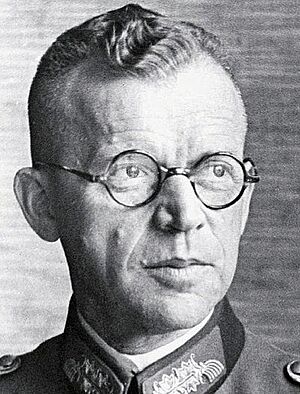Erich Fellgiebel facts for kids
Quick facts for kids
Erich Fellgiebel
|
|
|---|---|
 |
|
| Born | 4 October 1886 Pöpelwitz, Silesia, Prussia, Germany |
| Died | 4 September 1944 (aged 57) Plötzensee Prison, Berlin, Nazi Germany |
| Allegiance | |
| Service/ |
Army |
| Years of service | 1905–44 |
| Rank | General der Nachrichtentruppe |
| Commands held | Chief of Wehrmacht communications, Chief of Army communications (German: Chef of Wehrmacht-Nachrichten-Verbindunger) (abbr. Chef WNV), (German: Chef of Heeres-Nachrichten-Wesen) (abbr. Chef HNW) |
| Battles/wars | World War I World War II |
| Relations | Walther-Peer Fellgiebel (son) |
Fritz Erich Fellgiebel (born October 4, 1886 – died September 4, 1944) was a German Army general. He was an expert in military communications and a brave resistance fighter. He took part in secret plans to oppose dictator Adolf Hitler and the Nazi Party.
In 1929, Fellgiebel became the head of the German army's secret code office. This office later became very important for all military communications. He was key in bringing in the Enigma machine, a special device for sending coded messages. This machine helped keep German military plans secret.
Contents
Erich Fellgiebel's Military Journey
Fellgiebel was born in a place called Pöpelwitz, which is now in Poland. When he was 18, he joined the Prussian Army. He became an officer cadet in a signals battalion. Signals battalions are groups that handle military communications.
During the First World War, he served as a captain. After the war, he worked in Berlin as a General Staff officer. His service was excellent, and he was promoted to major in 1928. He continued to rise through the ranks.
Rising Through the Ranks
In 1933, Fellgiebel became a lieutenant colonel. The next year, he was promoted to a full colonel. By 1938, he was a major general. That same year, he was put in charge of the Army's Signal Establishment. He also became the chief of the Wehrmacht (the German armed forces) communications.
On August 1, 1940, Fellgiebel became a General der Nachrichtentruppe. This means he was a general specifically for communications troops. In 1942, he was promoted again. He became the Chief Signal Officer for the Army High Command. He held this important job until 1944.
Adolf Hitler did not fully trust Fellgiebel. Hitler thought Fellgiebel was too independent. However, Hitler needed Fellgiebel's special skills. Fellgiebel was one of the first to understand how important the Enigma machine was for the German military. As the head of Hitler's signal services, Fellgiebel knew many military secrets. This included information about rocket research.
Erich Fellgiebel's Resistance Efforts
Fellgiebel became friends with other high-ranking officers who opposed Hitler. Through these friends, he joined a secret group of German military officers. This group was working against the Nazi government.
The 1938 September Conspiracy
In 1938, Fellgiebel was part of a secret plan to remove Hitler from power. This plan was called the September Conspiracy. His job was to cut off all communications across Germany. This would have helped other officers take control of Berlin. However, this plan did not happen.
Sharing Secret Information
Fellgiebel also secretly shared important German military information. He gave details about a major German attack called Operation Citadel. This information helped the Soviet forces prepare and fight more effectively.
The 20 July Plot
Fellgiebel was deeply involved in the most famous attempt to stop Hitler. This was the 20 July plot in 1944. During this plot, there was an attempt to assassinate Hitler. Fellgiebel's role was to cut off all communication lines at Hitler's headquarters. This headquarters was called the Wolf's Lair.
He partly succeeded in cutting communications. But he could not stop some special SS (Nazi Party's security force) links. These links allowed news to reach Berlin that Hitler was still alive. When it became clear the assassination attempt had failed, Fellgiebel had to turn the communication lines back on.
Fellgiebel's most famous words that day were on the phone. He told a fellow plotter, "Something awful has happened! The Führer lives!"
Arrest and Execution
Fellgiebel was arrested right away at the Wolf's Lair. He was questioned for three weeks. But he bravely did not reveal the names of anyone else involved in the plot. He was put on trial before a special court called the "People's Court."
On August 10, 1944, he was found guilty. He was sentenced to death. Erich Fellgiebel was executed on September 4, 1944, at Plötzensee Prison in Berlin.
Memorials
The German Army has a barracks named after him. It is called the General-Fellgiebel-Kaserne. This honors his memory and his service.
Awards and Decorations
- Iron Cross of 1914, 1st and 2nd class
- Clasp to the Iron Cross, 1st and 2nd class
- Honour Cross of the World War 1914/1918
- Ottoman War Medal
- Military Merit Order, 4th class with Swords (Bavaria)
- Military Merit Cross, 3rd class with War Decoration (Austria-Hungary)
- Officer's Cross of the Order of Military Merit (Bulgaria)
See also
- List of members of the 20 July plot
- Lucy spy ring
 | Delilah Pierce |
 | Gordon Parks |
 | Augusta Savage |
 | Charles Ethan Porter |

